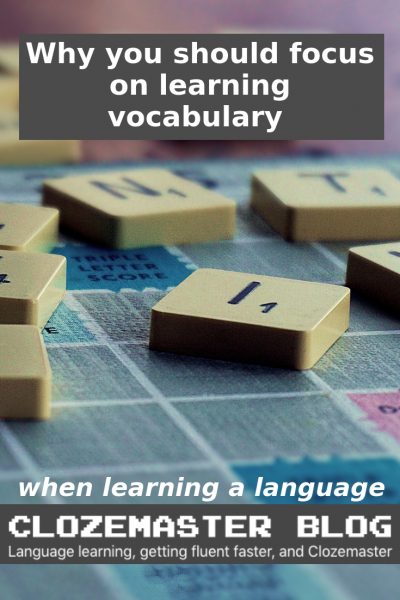When you decide to start studying a foreign language, it’s usually because of a dream.
You may be a literature student who dreams of reading original Russian copies of Dostoevsky’s famous literary works. You may be an importer who dreams of haggling with a feisty Moroccan carpet seller in perfect Arabic. Or you may simply be an anime fan who dreams of watching your favorite anime shows without having to rely on subtitles.
No matter what your goal is when learning a new language, you’re going to need to become fluent to achieve it. This means becoming proficient in all aspects of your target language, such as grammar, vocabulary, idiomatic expressions, writing systems, and phonology.
Unfortunately, most language students reach a point in their studies where the dream of fluency seems out of reach. You feel comfortable with the basics of the language, but when given a chance to use your new language skills, you seem to spend more time looking up unfamiliar words in the dictionary than actually speaking, reading or writing.
This problem has led both students and teachers to ask an important question – “What is the key to progressing past the initial stages of learning and achieving real fluency in a second language?”
Traditional linguistic theory suggested that grammar was the most important factor for achieving fluency. However, in recent years, a growing number of language teachers have come to believe that increasing vocabulary is the key to achieving fluency. This belief has been supported by a large number of language students who have found success using vocabulary learning apps such as Clozemaster to grow their vocabulary and improve their language skills.
If you’re unsure about the next step to take for achieving your goal of fluency, here are four reasons why you should consider focusing on studying vocabulary.
1. Without vocabulary, nothing can be conveyed.
When we break down both written and spoken language, we’re left with two basic things – vocabulary and grammar. Vocabulary represents the meaning-bearing units of language and grammar provides the rules and structures for assembling these units.
Grammar vs. Vocabulary
While grammar is undoubtedly important, it’s not a vital part of language. In most situations, you can ignore grammar rules and still get your message across. For example, even though the sentence “please coffee want one me” is just a collection of words with no specific grammar, you can probably understand that this person wants to order a coffee.
On the other hand, vocabulary is essential for effective communication. As British linguist David Wilkins famously stated, “without grammar, very little can be conveyed; without vocabulary, nothing can be conveyed”.
Professor of TESOL and author Dr. Keith Folse often uses his own experiences as a language student to show why a large vocabulary is vital for communication. Here’s an example from one of his papers:
On one occasion, I spent a long and trying hour in a small store in Japan trying to purchase flour without knowing the word for flour in Japanese. I couldn’t draw it. I couldn’t explain it. At one point, I even tried saying “pre-bread,” but that just produced more looks of confusion. In the end, I left the store without the flour. I had mastered beginning level polite forms for “Excuse me, where is the __?” but I did not know the Japanese word for flour to fill in that key blank space.
If you’re a language student who is trying to become fluent, there’s a limit to how far grammar study can take you. Once you reach that limit, you’ll be held back by your lack of vocabulary. You’ll encounter numerous words such as flour that you won’t be able to explain, and the only way to progress is to knuckle down, take out your notebook or study app, and learn those words.
2. The larger your vocabulary, the easier it becomes to learn new words.
Learning new words is one of the most difficult parts of studying a new language, especially for beginner and intermediate students. For most people in this stage, the only way to learn vocabulary is through rote memorization. You learn to recognize the new word in the target language, you learn the meaning of the word in your own language, and you repeat the word/meaning pairs over and over until you can recall them without thinking.
For example, if you’re studying French, you might repeat color/meaning pairs over and over until you remember them all – rouge is red, jaune is yellow, bleu is blue… rouge is red, jaune is yellow, bleu is blue…
This method of study is undoubtedly effective but can be very time-consuming.
However, once you start to increase your vocabulary and grow your language skills, you’ll find that you start learning the meaning of new words in a different way – through context rather than repetition.
Here’s an example in English:
“The pure white sand, green palm trees, and turquoise sea made this beach a real paradise.”

If you’re a student of English, you may be unfamiliar with the word turquoise. However, by examining other words in the sentence (eg. white sand, green palm trees), you can probably guess that the word turquoise refers to the color of the sea.
Learning from context
Learning through context is a great way to increase your vocabulary, as it’s fast, efficient, and easy. You no longer need to constantly stop to look up the meaning of unfamiliar words. Instead, you can breeze through textbooks, novels, movies, or whatever study medium you’re using. As you progress towards fluency, you’ll find that learning through context makes learning new words much easier.
However, the problem with learning words through context is that you first need to have a solid vocabulary foundation in place. Using the previous example, if you don’t know the meaning of the other words in the sentence (eg. white, sand, green, palm tree, sea, and paradise), you’re not going to be able to deduce the meaning of the word turquoise.
To take full advantage context learning you’ll need to work hard at building up your vocabulary foundation, and one of the best ways to do this is to use a vocabulary study app. Popular apps such as Clozemaster will even present new words in context, so you can increase your vocabulary and practice context learning at the same time.
3. Increasing your vocabulary lets you focus on more challenging aspects of language.
Here’s a situation that almost every language student has experienced.
You’ve studied hard and have finally got a chance to practice your new language skills with a native speaker. You start slowly by asking and answering simple questions. Soon, your confidence grows and the conversation starts flowing. It’s a fantastic feeling – you’re having a real conversation in a foreign language.
Suddenly, your conversation partner says a word that you don’t recognize…
“I went to a restaurant in Tokyo last night and ate some delicious tako.”
You hesitate.
Tako? I’ve heard that word before. Does it mean beef? No… beef is “gyuniku”. Maybe it means fish? No… that doesn’t sound right, either.
By the time you remember that tako means “octopus”, the conversation has moved on and you’ve completely lost track of what your partner has been talking about.

Proficiency in all aspects of language learning
This example highlights one of the most overlooked reasons for learning lots of vocabulary – it lets you focus on other aspects of language learning. When you no longer need to concentrate on remembering the meaning and spelling of words, you can devote more brainpower to other things that will help you achieve fluency.
Using the example above, instead of trying to remember the meaning of the word tako, you could be focusing on things like:
- Mimicking the sounds of the native speaker
- Learning the Japanese characters used to write the word tako
- Discussing cultural aspects such as how Japanese fishermen catch octopus or how it’s prepared by cooks
- Asking the native speaker to teach them related words such as the names and pronunciation of other sea creatures
Proficiency in all aspects of your target language and culture is vital for achieving fluency. If you devote more time to building your vocabulary now, you’ll be able to take better advantage of future opportunities to improve your weaker areas.
4. A large vocabulary lets you study in different, more interesting ways.
Most students use traditional study methods when they start learning a new language. A common strategy is using textbooks to learn grammar, vocabulary and useful expressions, audio recordings to improve listening skills, and notebooks to improve writing skills.
While this style of learning is undoubtedly effective for building a solid foundation, it can be extremely hard to keep up over a long period of time. For languages such as Arabic, Chinese, Japanese and Korean, students can expect to spend up to 2200 hours studying just to reach an intermediate level of proficiency. That’s a very long time to spend using just textbooks, notebooks and audio recordings.
Other ways of studying a language
Fortunately, there are many other ways of studying a foreign language that are both effective and enjoyable. Here are just a few ideas:
- Reading foreign language newspapers and books
- Watching tv programs, movies and YouTube clips from other countries
- Listening to foreign language music and podcasts
- Playing video games in a foreign language
- Installing a foreign language OS on your computer or smartphone
- Using language study apps
- Using social media in a foreign language
These study methods can provide a refreshing change to your regular study schedule. They also have the added bonus that you’ll be learning “real language” that native speakers use in their daily life (which is vitally important for becoming fluent), rather than “textbook language” that’s been simplified for language students.
Still need a large vocabulary
However, most of these study methods have one major problem – you need to have a fairly large vocabulary to be able to use them effectively. For example, this study of word frequency by Mark Davies suggests that if you’re a student of Spanish, you’ll need to know around 3000 words to read a non-fiction or fiction book and understand around 90% of the content.
While students with a limited vocabulary can have success with these methods, most will soon get sick of constantly pausing the movie, stopping the game, or putting down the newspaper to look up the meaning of unfamiliar words.
A much better learning strategy is to combine these different methods of study with traditional learning methods. For example, you could spend one hour a day using an app to study new vocabulary, then spend the next hour watching a foreign language movie to see how many of those new words you can recognize. This strategy will keep you refreshed and motivated, and before long, your goal of fluency will be within reach.
Using Clozemaster to Achieve Fluency
If you’ve decided to increase your vocabulary to achieve fluency in a foreign language, it’s important to have a fun, challenging and effective system for learning large amounts of new words.
With over 50 languages available in more than 170 language pairs, Clozemaster is a fantastic choice for app-based vocabulary learning. Its intuitive cloze testing method allows you to study new words in context, and the spaced repetition learning system helps you retain a large number of words in a short amount of time. And with over six million sentences and translations drawn from a collaborative dataset, you’ll always have new words to study.
If you’re interested in joining the thousands of students who have already had success using Clozemaster, head to www.clozemaster.com.



I was ready to quit but noticed … Translation. I covered the English sentence and used the game to learn how to say it in English.
WOW! That has to be put in the alg: to toggle English text on-off.
2. I need to see synonims after i answered the text (by clicking on Multiple choice list).
Interesting article. I believe that learning vocabulary is all about getting a feel for the sound of a word. If you know the pronunciation, you can imagine a word internally. That helps immensely.